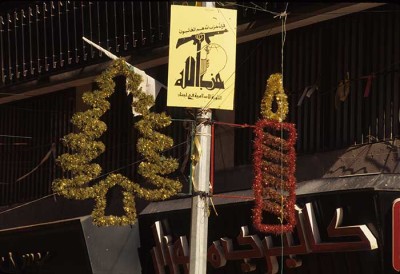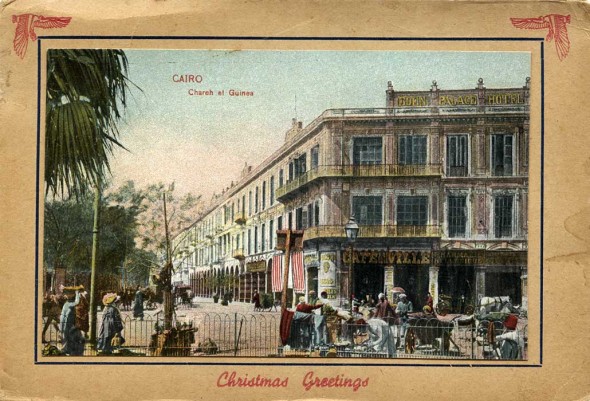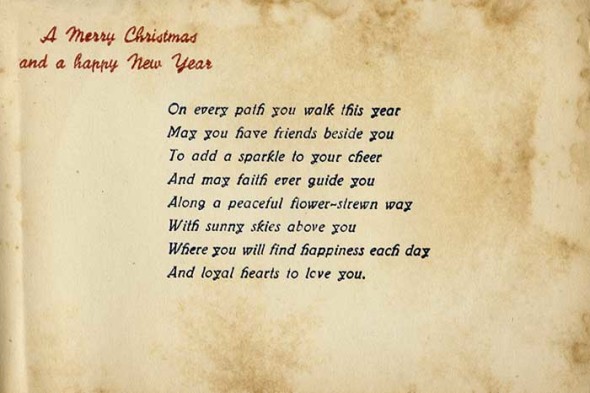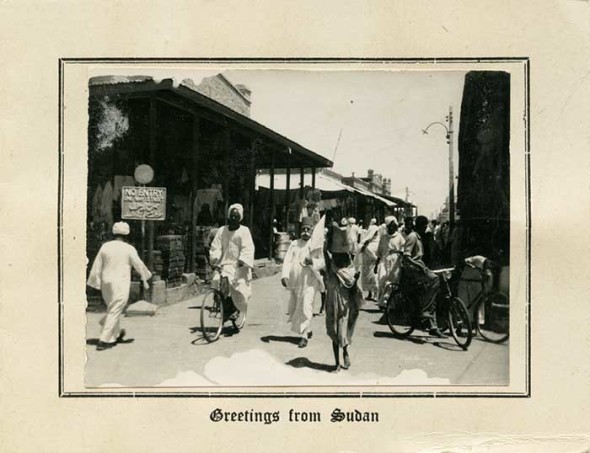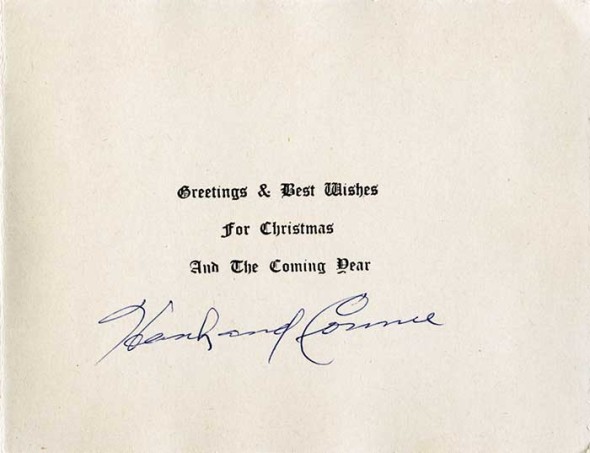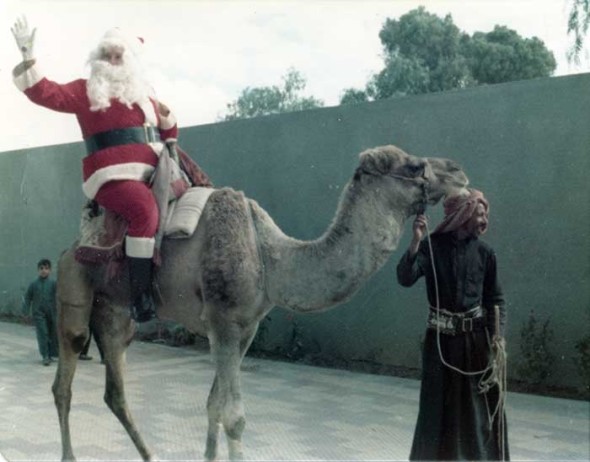
Santa Claus riding a camel somewhere in the Arabian peninsula, circa 1970s. Norbert Schiller Collection
In 1995, I was asked to illustrate a chapter for a book titled Christmas Around the World. At the time, I was in Lebanon spending the holidays with my wife’s family. I wanted to do something out of the ordinary, so I chose to document how Shi’ite Moslems celebrate Christmas. My driver Farouk, who happened to be a Shi’ite, told me that his family and all his neighbors in the Dahiyeh, Beirut’s southern suburbs, celebrated Christmas. Traditionally, Shi’ite Moslems have had a strong connection to Mariam the mother of Isa (Jesus), who is recognized as a prophet in Islam.
A few days before Christmas, Farouk and I set out for the Dahiyeh, where Hezbollah has a significant presence. As soon as we entered the area, we immediately felt the Christmas spirit. The lampposts, where Hezbollah flags are erected year-round, were also adorned with Christmas ornaments, sitting on either side of the party’s yellow and green flags featuring the infamous fist holding an AK-47. As we drove down the streets, we noticed veiled women with their young children shopping for Christmas trees and decorations. In the evening, we went out again and saw people in Santa Claus costumes handing out candy to children shopping with their parents. In many ways, the Dahiyeh felt more Christmassy than the areas of Beirut that are labelled as Christian.
As a long-time resident of the Middle East, I have a trove of memories of how the region’s different communities, Christian and other, celebrate this holiday. Like me, thousands of travelers who visited the Middle East and North Africa between the late 1800s up to the 1950s recorded their experiences and observations in words and pictures. This blog entry features short excerpts from travel books and memoirs, as well as postcards and other images focused on Christmas celebrations in the region during that time period.
Bethlehem, Palestine, Christmas Eve, 1890s
From Memories of my Pilgrimage to the Holy Land by M.M. (pages 28, 29, 30)
It was on Christmas Eve that we started for Bethlehem. Ah, what a joy was that walk under the bright stars, the cold night air, how exhilarating…As we enter the little village of Bethlehem, all seems to be astir and full of excitement. The villagers with lamps and torches try hard to force their wares upon the pilgrims. However, we manage to thread our way through the crowd of Arab, mules, camels, to the narrow passage that leads to the Basilica of the Nativity, which we find crowded.
It grieves one to see that the Greeks and Armenians have such a hold on Bethlehem, the Fathers of the Holy Land not being allowed to say Mass at the Altar of the Nativity. A Turkish sentinel has been placed on guard at the Grotto. But what do we care, as we gladly kneel to kiss the Holy Shrine.
Having three hours to wait till midnight Mass begins, each one tries to find a place, and to keep it, which proves anything but an easy task. The little place is crowded, the steps leading to the Grotto being packed with people. Shepherds are there in their rough sheepskin coats, and simple villagers mingle with pilgrims…How each pilgrim-heart went back to the Christmas night of long ago; to the little village so over crowded that “ there was no room in the inn! The dark sky was sparking with brilliant stars as we left humble Bethlehem on our way home to Jerusalem.
Cairo, Egypt Christmas 1898
From Egypt in 1898 by George Warrington Steevens (Pages 72,73)
When I got up I found the hotel full of bouquets of roses; a few people went out later, ostensibly to church; but otherwise the wandering English (tourists) made Christmas Day much like any other day. No such luck for the British residents. It seems when they first came here, the society of Cairo was much concerned to find that they had no day for all going around calling on each other, as Continentals do on their New Years Day, twelve days later, and Mussulmans (Moslems) at Bairam. On consideration, the society of Cairo decided that the British ought to have such an anniversary, and fixed on Christmas Day as the most suitable. The British had to bear it, and with time it has grown to an institution. So the ladies sit at home all afternoon dealing out tea, and the gentlemen go around, calling on everybody else, and Egyptian friends call on everybody after the same manner; so that the whole British colony, with native auxiliaries, rotates in a body round itself all Christmas afternoon.
Near the village of Zeraf Zaid, Sudan, Christmas 1902
From The Source of the Blue Nile by Author J. Hayes (Pages 36, 37)
Shortly after we had left Zeraf Zaid on the road to Gallabat we saw a great bustard near at hand. One of my comrades tried top shoot it for our Christmas dinner, but his luck failed him. However, I had brought the materials of a plum pudding with me from Cairo, and hoped that it would be a solace and a pleasant surprise for the other two members of our mess. The cook obtained some eggs in the village, and I gave him careful and emphatic directions and swore to him secrecy. Ours is a phlegmatic race. The cook did his work creditably, the pudding came to the table, and was eaten without comment…In honour of the day, and in expectation of entering Gallabat early on the following afternoon, I discharged a professional man’s duty towards his toilet, and scraped a week’s stubble from my face. In the wilderness even a doctor can neglect appearance.
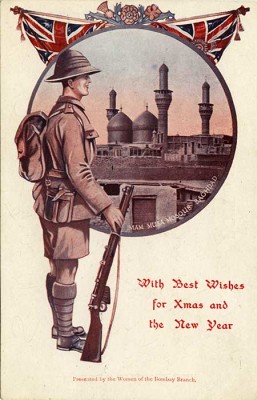
Christmas greeting card sent by British soldiers stationed in Mesopotamia during WWI. Norbert Schiller Collection
Baghdad, Iraq January 2, 1922
From a letter by Gertrude Bell to someone initialed H.B. The Letters of Gertrude Bell Volumes 1 & 2
I’ve been having an exceptionally horrid Christmas, as I will now recount. Captain Clayton, Saiyid Hussain and I intended to go to Baqubah on Dec. 23. The day looked very threatening, however we decided by telephone that we would start. In the afternoon the weather looked so bad that we gave up our scheme altogether. So there I was landed with Christmas holidays with nothing to do and nowhere to go, disgustingly cold and wet weather and an increasing cold which gradually developed into the worst I’ve ever had. It’s still very bad. Mr. Tod and Major Wilkinson came to lunch with me on Saturday, which was cheerful, and Nuri Said on Christmas day, after which I went to tea with the king—he lives a long way outside the town, up river, and the road was indescribable; however, I succeeded in getting there and we had a delightful talk…On Wednesday the damnable holidays were over but not my cold.
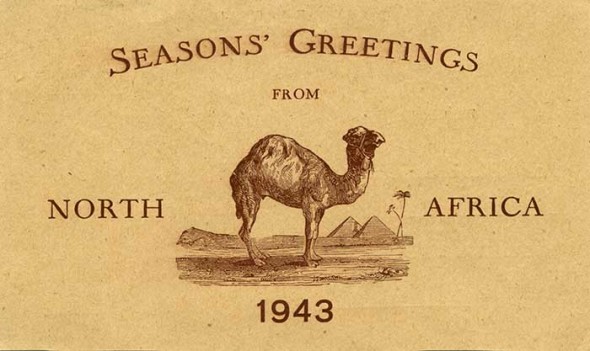
A Christmas card sent by Allied soldiers stationed in North Africa during WWII. Norbert Schiller Collection
Algiers, Algeria, Christmas 1942
From Army at Dawn: The War in North Africa, 1942-1943 by Rick Atkinson (page 250)
Algiers on Christmas Eve was festive if not quite spiritual. The white houses spilling down the hills gleamed beneath a mild winter sun. Palm fronds stirred in the sea breeze. French mothers bustled from shop tom shop in search of toys and sweats for their children. The price of Algerian Champaigne—Mousse d’Islam—doubled during the morning. Outside the city, soldiers decorated scrawny evergreens with grenades, mess kits, and ammunition bandoliers. Security had relaxed to the point that a sentry’s challenge was answered not with the daily countersign but rather with “it’s us, you daft bugger!” Nipping from the hidden casks of wine, troop swashed their uniforms in gasoline and gave one another haircuts in preparation for midnight chapel services. A signalman in the 1st division picked up the BBC broadcast of Bing Crosby singing “white Christmas;” men from the fighting first huddled around the radio and wept. Those of a more cynical persuasion, tired of looking at veiled women, composed a parody: “I’m dreaming of a white mistress.”
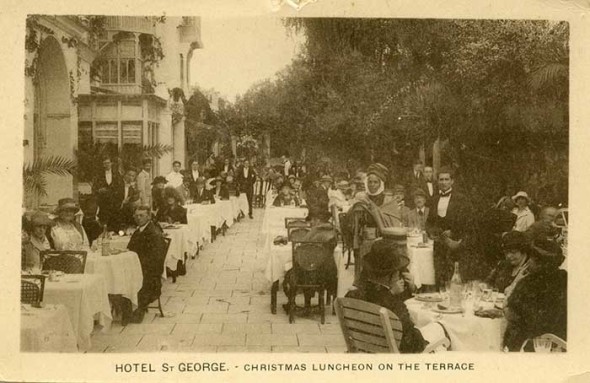
Christmas luncheon on the terrace of the Hotel St. George in Algiers, Algeria, circa 1920s. Norbert Schiller Coillection
Algiers, Algeria Christmas 1942
From Army at Dawn: The War in North Africa, 1942-1943 by Rick Atkinson (page 256)
For a man who had just lost a critical battle and spent thirty hours in the rear seat of a car, Eisenhower was in buoyant spirits on Christmas night. Stiff and pallid after the long drive, he soon revived upon reaching AFHQ headquarters at six P.M. A quick staff meeting; a quicker, handwritten sympathy note to Madame Darlan (“You have the consolation of knowing that he died in service of his country and that we view his passing with regret”); and then it was off to Beetle Smith’s mosaic-floored villa. Eisenhower ambled into the foyer singing in his fine deep voice:
God rest ye merry, gentlemen,
Let nothing you dismay.
With a small clique of officers, the commander-in-chief tucked into a Christmas feast of plum pudding, Champaign, and roast turkey. Patton had sent from Casablanca two live birds, one of which survived the journey long enough to be stuffed, cooked and devoured. So merry and undismayed did the gentlemen celebrate that at breakfast the next morning Harry Butcher requested only “a bowl of aspirin.”

